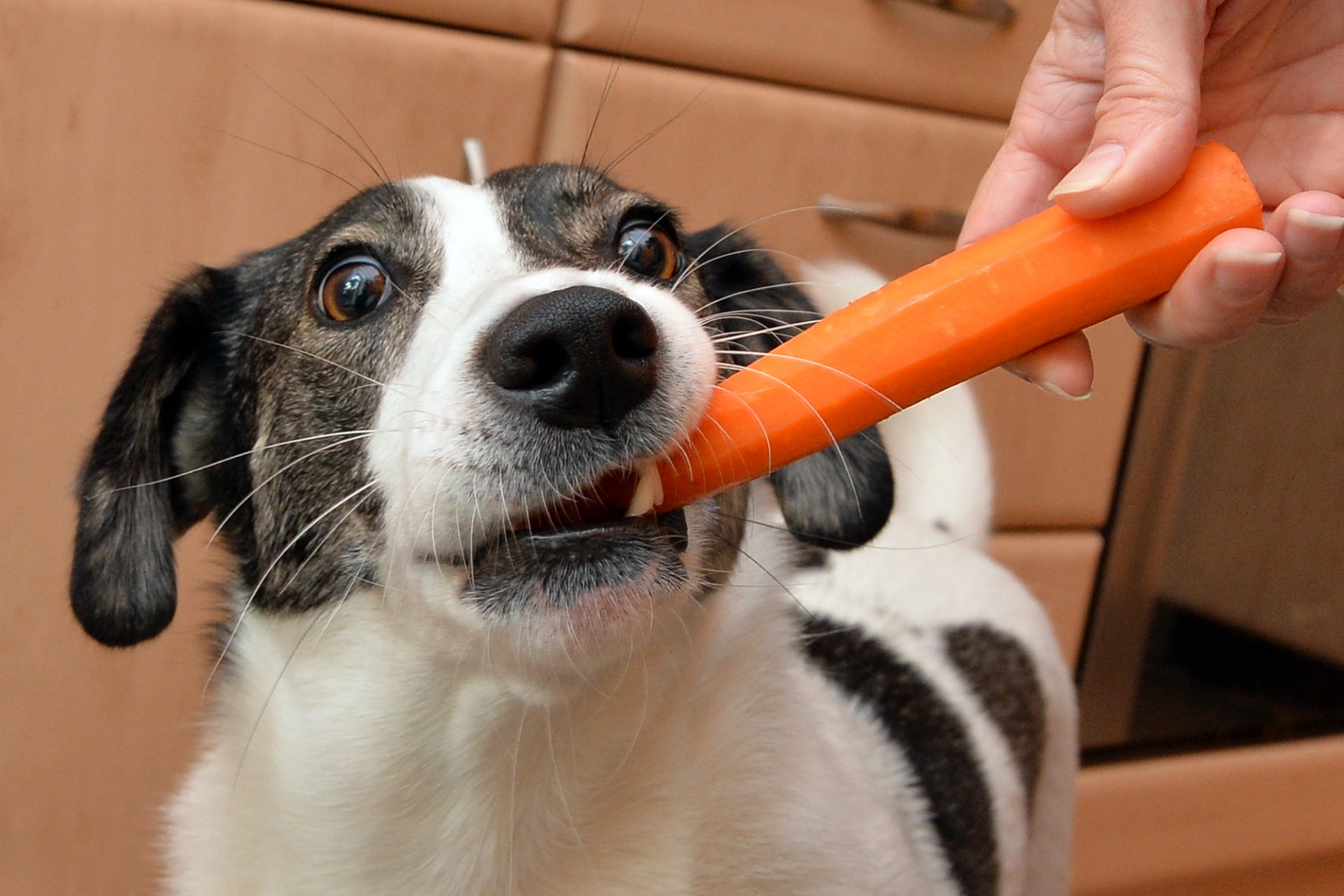Debate: can dogs really eat a vegan diet and be healthy?
Is your dog craving vegetables? Is vegan diet what he is after? It might sound crazy but some people think dogs should be vegan!
Could a vegan diet be healthier and less dangerous for dogs than the traditional meat-based diet or is it just utter nonsense? Join us as we take a look at the findings of a new study on the subject and what you need to consider if you want to change the diet of your four-legged friend.
As veganism has grown in popularity some people are wondering if their furry friends should be eating vegan too. However, is it species-appropriate and healthy to feed dogs and cats vegan food?
There are approximately 470 million dogs in households worldwide. In 2020, around $9 billion worth of vegan pet food was sold worldwide, according to The Guardian. However, extensive studies on the effects of vegan diets on dogs have so far been lacking.
The 2022 study 'Vegan versus meat-based dog food: Guardian-reported indicators of health', led by Andrew Knight, Professor of Animal Welfare and Ethics at the University of Winchester, had the initial hypothesis that dog health indicators reported by owners do not depend significantly on their diet.
More than 2,600 dog owners each with a dog were accompanied by the scientists from the British University of Winchester for a year, who monitored the health of their furry friends. The majority of participants came from the UK, with some from North America and Australia.
(Photo: Jamie Street / unsplash)
The following factors were taken into account in the study by Andrew Knight, Eason Huang, Nicholas Rai and Hazel Brown, among others: how often the vet had to be visited that year, whether the dog was given medication, the subjective impression of the dog owner, the need for a special diet as well as diseases that have occurred and their frequency.
(Photo: Bequest /pixabay)
A prerequisite for the vegan feed was a carefully selected composition with additional synthetic nutrients. Dogs fed vegan (13%), traditional (54%) and meat-only (33%) diets were examined in the study. Animals with a vegetarian or mixed diet were not taken into account.
(Photo: James Barker / unsplash)
At first it looked like dogs fed raw meat (aka BARF) were healthier than vegans. However, the researchers pointed to several factors opposing a conclusion that eating raw meat is healthier, e.g. For example, the dogs in this group were significantly younger than those in the comparison groups.
Photo (M Burke / unsplash)
The results of the participant questionnaires also indicated that the owners of BARF dogs generally visit a veterinarian less often. Previous research has shown that a raw meat diet is associated with an increased risk of pathogens and nutrient deficiencies.
(Photo: Andrew Lancaster / unsplash)
According to the research published on the Plos One science platform, the percentage of dogs with health problems was 49% for the conventional diet, 43% for the raw meat diet, and 36% for the vegan diet.
Professor Knight told the Guardian: "One of the most common health problems affecting dogs is being overweight or obese and it is unfortunately common for commercial meat foods to be higher in calories." The health hazards associated with the excessive consumption of meat and dairy products in humans would, in most cases, also apply to dogs, since the same or similar ingredients are used.
The study leader told The Guardian: "Dogs, cats and other species have nutritional needs, they don't need meat or any other special ingredient." It is important that the feed contains a range of nutrients, is tasty and easy to digest. Another result of the study was that dogs that were fed traditionally performed worse in terms of health than BARF and vegan dogs.
(Photo: Ron Fung / unsplash)
Some veterinarians are against a vegan dog diet because the dog's lineage should not be ignored. They are omnivores. Dog owners should therefore not completely do without meat when feeding their four-legged friends. In addition, the dog's metabolism processes animal protein from meat better than plant protein, which comes from grain, for example.
(photo three cubic / unsplash)
Although many animal welfare associations are clearly in favor of a vegetarian or vegan diet for humans, they seem to be more3 cautious when it comes to vegan or vegetarian food for dogs and cats.
(Photo: Lepale / pixabay)
Experts recommend that anyone who feeds their dog a completely meat-free diet for a long period of time may only do so with a scientifically prepared meal plan and with veterinary control. An adult, healthy dog can occasionally eat a vegetarian diet instead of a meat-based diet. In this case, however, the vegetable protein in the meal should be upgraded with low-fat quark cheese or boiled eggs.
(Photo: ElfinFox / pixabay)
Vegan feeds can inhibit gastric juice secretion, which means that the pH value is not low enough and the effect of certain enzymes is reduced. An excessively high pH value in the stomach and in the urine means that the environment in the small and large intestine is also too alkaline, which can trigger digestive problems and the formation of kidney stones.
(Photo: Berkay Gumustekin / unsplash)
It is precisely this question that causes controversial debates on forums on the internet and among veterinarians. There is no 100% correct answer to this question, even if vegan feeding is allowed in your country, unlike in England, where owners can expect a fine.
(Photo: BLACK17BG / pixabay)
Dogs have been increasingly domesticated and integrated into the family over the centuries. In the beginning, our four-legged friends got the leftovers from their owners and therefore adapted their digestion to human food. Only in the last few decades have we started to make sure our best friend eats healthy, compare products or to even cook special meals for our furry companions.
Research on vegan diets for pets is still in its infancy. The scientists of the new study therefore point out that further investigations are necessary.
(Photo: Jamie Street / unsplash)
In their final report, the researchers also write that previous studies have shown that eating raw meat is more often associated with an increased risk of pathogens and malnutrition. It is therefore very likely that the vegan diet is the healthiest.
(Photo: Jametlene Reskp / unsplash)
A 2021 preliminary study concluded that dogs find plant-based dog food just as tasty as conventional meat-based dog food. Of course, this also depends on the individual taste of the pup.
First, any change in diet should be well informed and done slowly. The age of the dog, the breed and possible previous illnesses should also be taken into account. Experts also advise owners to have their pets' urine, eating habits and weight changes checked regularly to ensure all the necessary nutrients are present.
All doctors agree: Regardless of the diet, it is important for dog food that the macronutrients (proteins, carbohydrates and fats) and all micronutrients (vitamins, minerals and trace elements) are contained in sufficient quantity and quality. Dogs should never be given the same nutritional supplements as humans.
(Photo: Alkhaine/pixabay)
Not everything that master or mistress eats is good for dogs. Both vegan and milk chocolate are strictly forbidden for dogs. Cocoa beans contain theobromine, a very harmful and toxic substance that our pets cannot break down.
Nuts and dried fruits often attract the attention of our four-legged friends, but they are toxic and dangerous as they can affect the nervous and digestive systems.
While they're popular for their folic acid, vitamin K, potassium, and vitamin E, don't serve avocados to your dog. They are high in fat and contain persin, a toxin that can severely damage your pet's heart muscle and stomach.
(Photo: Kjokkenutstyr / pixabay)
Grapes should also not be on the menu. They damage the kidneys and can lead to kidney and liver disease. Spices should also be avoided. Sliced apples are healthier.
(Photo: Couleur / pixabay)
You shouldn't feed your dog the same complete food for life. By changing it regularly, you can ensure that the animal really eats a balanced and varied diet. In addition, you prevent the risk that the animal only wants to eat one type.
(Photo: Oliver / unsplash)
You can also provide variety by offering rice, potatoes, vegetables and low-fat quark, depending on the furry family member's preferences.
(Photo: Justin Veenema / unsplash)
"Many may find it strange to feed a dog vegetarian or vegan," said Josef Kamphues, professor of animal nutrition at the University of Veterinary Medicine in Hanover, in a Spiegel interview. Every dog owner has to make their own decision. And some would just like to feed the entire family the same way - including the family dog.
More for you
Top Stories












































